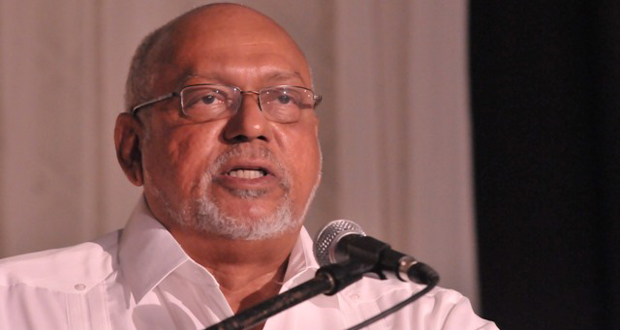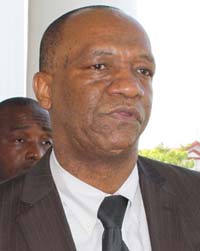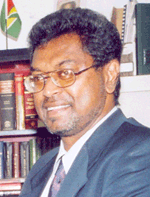
General election looms… APNU, AFC reject President’s invitation for talks – HPS says rejection of President’s invitation for talks will be seen as final position
THE combined Opposition, A Partnership for National Unity (APNU) and the Alliance For Change (AFC), have rejected President Donald Ramotar’s invitation, issued via a letter on Tuesday, for talks following the prorogation of Parliament
General Secretary of APNU, Mr. Joseph Harmon, told the Guyana Chronicle yesterday that the main Opposition considered the President’s invitation during a meeting of its Executive Council and their position is that there will be no talks.
“We have said this before and our position remains the same, APNU will not engage the President in talks unless the prorogation of Parliament is lifted.”
The AFC Leader, Mr. Khemraj Ramjattan, echoed similar sentiments.
In an invited comment, Mr. Ramjattan told the Guyana Chronicle that his party has not received a letter from the President.
“I have not received a letter and I do not think I want to receive a letter. If a letter does come, I will have to pull a ‘Janet Jagan’ (the late former President of Guyana) and throw it over my back,” he said, referring to Mrs. Jagan’s rejection of a court order preventing her coronation as President, which she threw over her shoulder at a ceremonial event at State House after the 1997 elections.
The combined Opposition’s rejection of President Ramotar’s invitation comes after the Head of State has, as recently as last Friday, expressed optimism that the combined Opposition will reconsider their ‘first position’, in which they rejected the possibility of talks.
FINAL POSITION
Meanwhile, Head of the Presidential Secretariat (HPS), Dr. Roger Luncheon, told the media that the rejection of the President’s invitation to APNU and AFC for talks will be considered the combined Opposition’s final position on the matter.
Dr. Luncheon, speaking yesterday at his weekly post Cabinet press conference at the Office of the President, Shiv Chanderpal Drive, added that no agenda was set for the proposed talks, given the Opposition’s stance, but an invitation was made in earnest and once this is responded to the “when, what, where and how” will be addressed.
“GOAT AIN’T BITE”
“We stand ready to engage the Opposition,” he stressed, adding that “goat ain’t bite” the current Administration and it can “pull the plug” on the 10th Parliament, via dissolution, if efforts to engage the two Opposition parties fail.
President Ramotar has repeatedly stressed that he has no intention of re-proroguing Parliament.
CLEAR POSITION
In proroguing Parliament last Monday, he was also emphatic that the move to prorogation was intended to pave the way for greater dialogue among political parties, while keeping the 10th Parliament alive.
The effect of ending the first session of the 10th Parliament via prorogation is the termination of the business of the National Assembly.
As a result the AFC sponsored no-confidence motion was not considered. Also, APNU had, prior to Monday, signalled its intent to support the push through of the motion. Had it not been for the proclamation to prorogue Parliament, if the no-confidence motion was passed, Guyana would have been headed to early general elections within three months.
According to the Head of State the move to prorogation was intended to pave the way for greater dialogue among political parties, while keeping the 10th Parliament alive.
However, Mr. Ramotar has made it clear that if these efforts prove futile, there will be a move to early general elections. The last general elections were held in November 2011.
THREE OPTIONS
Dr. Luncheon highlighted that in the face of political gridlock, which has characterised the 10th Parliament, the President had three options: dissolve the Parliament and move straight to early general elections; allow the AFC no-confidence motion, a debate that the Government would have won, even if it lost the vote with its minority in the National Assembly; or prorogue Parliament and allow for dialogue in the interest of the nation.
“The President chose prorogation,” he said.
Responding to a question, the HPS acknowledged that there may be a sentiment in some sections that a resort to prorogation could translate to the scoring of “political points” for the Government, to say that the Government made every effort to engage the combined Opposition.
However, he made it clear that this does not reflect the “fundamental aspirations” of the Guyanese people. “There is an interest in having this problem (political gridlock) solved,” Dr. Luncheon said.
The prorogation is constitutionally provided for in Section 70 (1) in the laws of Guyana and can last up to a maximum of six months.
The law reads: “70 (1) The President may at any time by proclamation prorogued Parliament. (2) The President may at any time by proclamation dissolve Parliament. (3) Parliament, unless sooner dissolved, shall continue for five years from the date when the Assembly first meets after any dissolution and shall then stand dissolved.”
OPPORTUNITY LOST
The HPS noted that Cabinet at its meeting on Tuesday bemoaned the fact that if the President’s invitation for talks was rejected, the decision would represent a lost opportunity.
He explained that this sentiment, the loss of a “golden” opportunity, extended to the fact that there are several important areas of work in the National Assembly that ought to be dealt with at the earliest, as opposed to having them carried over to an 11th Parliament, which would be constituted after general elections.
Some of these matters include: the Anti-Money Laundering and Countering the Financing of Terrorism (AML/CFT) (Amendment) Bill, which is in Parliamentary Special Select Committee; the second readings of the Education Bill 2014, the Land Surveyors Bill 2014 and the Broadcasting (Amendment) Bill 2014 are up for a second reading. Also among the Bills scheduled for a first reading are the Food Safety Bill 2014 and the Motor Vehicles Insurance (Third Party Risks) (Amendment) Bill 2014. Other important matters before the National Assembly include the appointment of members for the Rights of the Child Commission (ROC) and the Women and Gender Equality Commission.
“Cabinet felt that there needs to be some understanding of the result of this choice (rejecting the invitation for talks…as opposed to what dialogue offers…this (dialogue) would be giving us a chance, even if it is a last chance,” Dr. Luncheon said.
The HPS added that a response from the combined Opposition could come in a week or less.
“We would like to have a timely response…I would think that at least for the Administration, and dealing with the leader of the Opposition, who is a reasonable political…I would want to expect an answer soon. I do not believe that Mr. Granger belongs to that ilk that would see benefit in dragging this out,” he concluded.
extracted from the Guyana Chronicle



